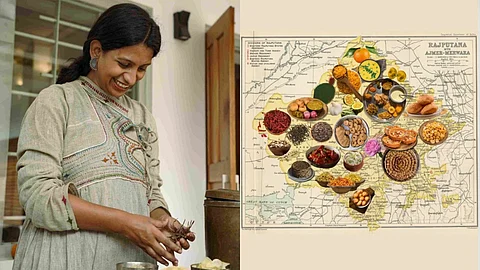
- HOMEGROWN WORLD
- #HGCREATORS
- #HGEXPLORE
- #HGVOICES
- #HGSHOP
- CAREERS
- ABOUT US
- CONTACT US

I'm currently watching The Mentalist. During meals and after work, I see the protagonist work his charm on people and occasionally hypnotize them to unveil their secrets. This, paired with the solid cooking streak I have going on right now, has got me thinking about my dad who passed away a few years ago. If I had access to a mentalist of my own, I'd have him unearth the recipes I have hidden deep in my memory from the time I spent with my dad in the kitchen. Since his death I have been trying to find ways to feels close to him and his food is one of them. Sadly I have access to but a fraction of those recipes and this loss feels like big one.
We share a bond through food be it a family or a culture. When recipes are forgotten, it feels like an erosion of history. And that's what's been happening in the last few decades. With urban jungles and apartments replacing homes with sprawling courtyards and kitchen gardens, and jobs keeping us chained to desks, our kitchens — once the beating heart of family life — feel eerily quiet. Recipes handed down like family heirlooms are vanishing — buried under a mountain of food delivery apps and ready-to-eat meals. The joy of slow-cooked meals and storytelling over spice jars and the ritual of passing down culinary secrets has become a thing of the past for many like myself.
But one woman from Jaipur is on a mission to change that. The Kindness Meal is a project by Dipali Khandelwal founded to preserve Rajasthan’s disappearing food traditions. Her love for cooking rooted in her childhood spent in a joint family, where Dipali grew up amidst a symphony of clinking pots and sizzling pans. Her grandfather, a culinary perfectionist, passed down his passion for food with every locally sourced ingredient and cherished recipe. It’s no wonder she grew up with a deep appreciation for the stories behind every dish.
The spark for The Kindness Meal ignited during Dipali’s years of traveling across India as an art and culture curator. She noticed how modern convenience foods were eroding native culinary practices, even in rural areas. In one heartbreaking encounter, a woman from Bikaner confessed that she stopped feeding her son bajre ki roti (millet flatbread) because she feared city folk would mock him for eating 'villager food'. The shame tied to indigenous foods, Dipali realized, was causing an entire generation to shy away from their roots.
Food may be deeply personal and cultural, but it can and does get tangled up in class, caste, and even colonial narratives. Dipali noticed how foods like bajra roti or jadi ber ki chai — once everyday staples — are now labeled "poor people’s food". It's this weird hierarchy where native foods, especially those tied to marginalized communities like Dalits, are considered 'less than'. And the problem isn't just local. Where Italian cuisine is globally celebrated, North American and South African indigenous foods are looked upon, ironically, as uncultured. It’s the same colonial lens at work. What’s 'exotic' is worth savoring, but what’s 'native' is seen with pity or outright disdain. This dismissal erases not just recipes but the people and histories behind them.
Determined to reclaim these lost recipes here in India, Dipali embarked on a culinary journey, venturing into Rajasthan’s nine distinct cultural zones. From the desert region of Marwar, where dishes like ker sangri (a caper berry curry) are born of necessity, to the fertile Bagad region known for its abundance of wheat and milk-based dishes, Dipali uncovered a treasure trove of micro-cuisines. She felt the need to highlight these specific locales dismantle the homogenized perception we have when it comes to regional cuisine.
The Kindness Meal is centred around generational sharing. One of Dipali’s most innovative initiatives is the Food Culture Play Dates, designed to teach kids aged 7–14 about their culinary heritage. Children are encouraged to become mini ethnographers, interviewing their grandparents about traditional recipes and the stories behind them. These sessions often unearth incredible family memories and teach kids about the importance of food in their cultures.
Dipali’s pop-up dining events bring Rajasthan’s hidden flavours to the fore. She not only serves the food but also shares its origin stories, connecting people to the land and its culture. Her work is about challenging stereotypes when it comes to food. Through traveling museums filled with rare ingredients, photo essays, and audio stories, she introduces audiences to the diversity of Rajasthan’s foodscape. Lately she's also been collecting and sharing recipes from remote communities in the Northeast as well.
For Dipali, food is a bridge between generations and a link to our roots. A loss of these generational recipes is a loss of identity. Through the Kindness Meal, She aims to fight the erosion of India's native culinary imprint and cultivate pride in in where we come from through our food.
Follow The Kindness Meal here.
If you enjoyed reading this here's more from Homegrown:
A Taste Of Winter: The Many Pleasures Of Sweet Bengali 'Peethay' Pancakes & Dumplings
Bajre Ki Raab, Milagu Rasam, & More: Warm Your Heart With India’s Toastiest Winter Brews
That We Uspresso: South Indian Filter Coffee Is Officially The Best Coffee In The World
